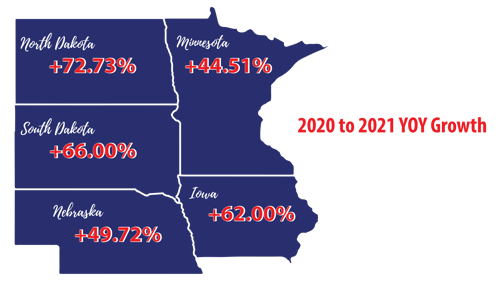The ROI of Installing EV Chargers: A Guide for Midwest Business Owners
The electric vehicle (EV) revolution is not just a coastal trend; it's making its mark in the heartland too. For Midwest business owners, the prospect of adding EV chargers has become increasingly appealing. But what is the tangible return on investment (ROI)? In this guide, we'll break down the costs, benefits, and potential ROI of installing EV chargers for your Midwest business.

The Rise of EVs in the Midwest 
The number of EVs on Midwest roads is increasing. By providing charging stations, businesses can cater to this growing demographic, ensuring loyalty and repeat visits from EV owners. The trajectory of EV adoption suggests it's not a matter of "if" they will become predominant, but "when." Taking the initiative to install charging stations today positions your business as forward-thinking, showcasing your readiness for an inevitable EV-centric future.
Enhancing Your Eco-friendly Image
As global attention pivots towards sustainability, businesses championing eco-friendly initiatives distinguish themselves from the crowd. Incorporating an EV charger signals more than just eco-conscious appeal—it underscores your brand's commitment to a sustainable future.

Let’s Dive Into the Numbers
1. Capital Cost
Before diving into the actual figures, you'll first want to determine how many chargers suit your needs. This decision can be influenced by your objectives, anticipated traffic, or available space. Often, it's advisable to start with a single charger, then monitor its usage reports. This data can guide decisions on whether additional units are warranted.
- Device Costs: The price of chargers varies based on their type. For instance, Level 2 chargers typically range from $6,000 to $11,000, while DC Fast Chargers (DCFC) can set you back anywhere between $50,000 to $100,000.

- Installation Costs: These are influenced by various factors such as the requisite electrical work, location, number of units, equipment size, initial setup, training, signage, and even considerations like parking lot striping. Generally, you're looking at a range of $7,000 to $70,000.
- Maintenance Plans: To ensure your investment continues to deliver, it might be wise to opt for a maintenance plan. The annual cost of these plans can range from $400 to $13,000. It's worth noting that the specific model of your charger and the duration of your service contract will significantly influence this cost. Longer-term contracts, such as 3 or 5 years, often come with substantial savings compared to annual renewals. Moreover, committing to a longer-term upfront could be financially savvy, especially if you can roll this cost into your tax credits and rebates claims.
- Tax Incentives & Rebates: Encouragingly, both federal and state governments are extending their support to boost EV adoption. For businesses in the Midwest, this translates to a suite of tax credits, rebates, and even grants that can significantly offset the initial outlay, fast-tracking the return on investment. At present, the Federal EV Charger Tax Credit stands at $100,000 per location, albeit capped at 30% of the project's total cost. To explore a comprehensive list of available incentive programs tailored to your locale, visit BriteSwitch.
2. Energy & Charge Rates
When delving into the financial aspects of installing EV chargers, understanding the electricity costs and potential charging rates is crucial.
- Cost of Electricity: Firstly, get familiar with your local electricity rates. For instance, in South Dakota, the average cost for commercial properties is approximately 10.13 cents/kWh.
- Charging Rates for Drivers: Decide on the price you wish to charge drivers per kWh. Presently, the going rate at South Dakota's charging stations oscillates between $0.30 to $0.60. If the chargers are intended solely for your business fleet, you won't have charging fees for the drivers.
- Anticipated Usage Level: Estimating daily usage is a pivotal step in planning for EV charger integration. Broadly speaking:Low Usage: Approximately 45 kWh per day.
- Medium Usage: Roughly 60 kWh per day.
- High Usage: Close to 90 kWh per day.
- Dynamic Pricing: Many modern charging devices offer software that allows dynamic pricing. This feature lets you adjust rates based on specific times or days, optimizing revenue while catering to demand trends.
3. Projecting Your Net Revenue Gains from EV Chargers
EV chargers are not just about sustainability—they're revenue drivers. By introducing these chargers, businesses can tap into the rapidly growing segment of EV drivers who, in search of a quick charge, might just decide to spend more time—and money—at your establishment.
Hotel Example:
- Assumption: A conservative estimate suggests 5 additional room bookings per week due to EV chargers. (Note: Some studies indicate that hotels with EV chargers can see up to a 30% increase in bookings from EV owners.)
- Revenue Impact: With each room priced at $100 per night, this equates to a potential added annual revenue of $26,000.
4. Calculate Your ROI
Let’s streamline this for you:
- Head over to our website: https://energyoptions.pro
- In the upper right corner, look for and click on the “ROI Calculator” button.
- Input the details you’ve just collected.
That’s it! Our tool will swiftly display your ROI in terms of Break-Even Years. But remember, we're here to guide you. If you'd prefer a helping hand in navigating this process, don’t hesitate to schedule a call with our team. Choose from a 15-minute, 30-minute, or 1-hour consultation—completely complimentary and with no strings attached.
But there’s more to the story than just figures. Investing in EV chargers is also an investment in your brand's future. It cements your image as a visionary business, one that supports its community and embraces the future. The upfront costs might seem substantial, but the multitude of long-term benefits—both tangible and those less quantifiable—deems it an invaluable venture for Midwest entrepreneurs.
Don't wait until EVs dominate the roads – make a sustainable investment for your business today while you can gain that incredible competitive advantage and reap the benefits of the available tax incentives currently available.


